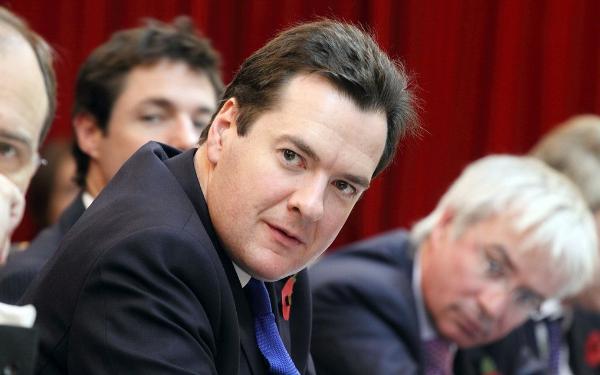As the Chancellor of the Exchequer makes his Autumn Statement and the Opposition make their criticisms, Joe Egerton takes the long view and suggests that we need to consider the scenario that sustained, long term growth is a thing of the past. How, as Christians, might we respond to that challenge?
The Editor of Private Eye hit on something really significant when he observed that the Occupy London protest has ‘succeeded in getting three quite well meaning priests removed and no bankers at all’. It has become exceptionally difficult for Christians to respond to economic, social and political questions. We are finding it very hard to articulate a vision of the common good in a static or even shrinking economy.
The Chancellor’s autumn statement offers us an occasion to ask why this is so and what we are to do about it.
The comfort of prosperity
The principles of Catholic Social Teaching (CST) are not too difficult to advocate in an age that has, with a few very painful interruptions, seen a sustained increase in wealth unprecedented in human history. Rerum Novarum – Leo XIII’s great encyclical and the original charter document of CST –challenged nineteenth century beliefs, but the direction in which the Pope pointed seemed relatively painless when growth meant that both rich and poor could get richer. The prodigious contribution of John Paul II came during a period of unprecedented growth: the national income of the United States, Britain and the rest of Europe approximately doubled during his long pontificate. Affluence induces a benevolence that is hospitable to the idea of preference to the poor; if we look back in history, we see that this is a well established pattern. The common good is an important feature of the worldview of St Thomas Aquinas, who wrote his Summa Theologiae in the 1270s, at the high point of France’s thirteenth century economic boom.[1] The Salamanca School’s great developments of political and early economic theory in the sixteenth century coincided similarly with an economic boom.
In contrast it is when boom turns to bust that the hands-on practice of CST at the level of the parish and local community is at its most challenging, although even in times of general prosperity many of those who have spent their lives working in areas of deprivation have been called on to display heroic virtues. Our difficulties in offering a coherent account of how the common good translates into economic and social policies does not seem to have affected the ability of Christians to go out and bring both help and hope in the dark places of the world. And it is through practising our faith in the world that we most often bring people to Jesus Christ: as he told us, we are to bring light to the world through good works.[2] Consider, for instance, this conversion account:
You see, I was not raised in a particularly religious household, but my mother instilled in me a sense of service and empathy that eventually led me to become a community organizer after I graduated college. And a group of Catholic churches in Chicago helped fund an organization known as the Developing Communities Project, and we worked to lift up South Side neighborhoods that had been devastated when the local steel plant closed.
And it was quite an eclectic crew – Catholic and Protestant churches, Jewish and African American organizers, working-class black, white, and Hispanic residents – all of us with different experiences, all of us with different beliefs. But all of us learned to work side by side because all of us saw in these neighborhoods other human beings who needed our help – to find jobs and improve schools. We were bound together in the service of others.
And something else happened during the time I spent in these neighborhoods – perhaps because the church folks I worked with were so welcoming and understanding; perhaps because they invited me to their services and sang with me from their hymnals; perhaps because I was really broke and they fed me. (Laughter.) Perhaps because I witnessed all of the good works their faith inspired them to perform, I found myself drawn not just to the work with the church; I was drawn to be in the church. It was through this service that I was brought to Christ.[3]
But it would be a large mistake to jump from this to a rejection of idea that the Church has a voice in the public square; for President Obama followed this description of his road to Christ with the following:
And at the time, Cardinal Joseph Bernardin was the Archbishop of Chicago. (Applause.) For those of you too young to have known him or known of him, he was a kind and good and wise man. A saintly man. I can still remember him speaking at one of the first organizing meetings I attended on the South Side. He stood as both a lighthouse and a crossroads – unafraid to speak his mind on moral issues ranging from poverty and AIDS and abortion to the death penalty and nuclear war. And yet, he was congenial and gentle in his persuasion, always trying to bring people together, always trying to find common ground. Just before he died, a reporter asked Cardinal Bernardin about this approach to his ministry. And he said, ‘You can't really get on with preaching the Gospel until you've touched hearts and minds.’
Two foundations of Christian dialogue
President Obama’s articulation of the road to the common good has two important characteristics that go back to Thomas Aquinas and indeed further. As Alasdair MacIntrye argued,[4] on Aquinas’s account, the search for the common good is not something that can be done in isolation – it requires dialogue with others, most especially those who disagree with us.
The second is the importance of touching both hearts and minds. According to Aquinas, all error is ultimately intellectual error: Ignatius does not disagree but brings the added insight that both truth and error are felt through the heart.
Our difficulty is intellectual. Deep inside the Christian tradition is a belief entirely at odds with much of modernity – a rejection of the idea that acquisition and growth are the ultimate good for humans. Adam Smith, who commented that, ‘It is not from the benevolence of the butcher, the brewer, or the baker, that we can expect our dinner, but from their regard to their own interest’, was nevertheless clear that the belief that acquisition of goods makes us truly happy is ‘a useful deception’. His successors lost this insight. Sustained growth has absolved us from the need to make hard choices and so we have had no reason to challenge the zeitgeist. But perhaps we in our age are called on to do something that neither St Thomas nor St Ignatius nor Leo XIII nor John Paul II had to do: persuade the world to accept a vision of the common good that means real sacrifices by those who have so that those who have not may enjoy a just share of the goods of this world.
Will growth return?
This problem does not arise, or at least does not arise too seriously, if the economy recovers at, say, 3% a year and by 2015 we are arguing over how to use the extra resources. But what if it does not?
In questioning this, I am not seeking to side with Mr Osborne against Mr Balls or Mr Balls against Mr Osborne over fiscal policy. My scepticism is based on a suspicion that we cannot any more count on economic growth.
Consider this description of a country: ‘the countryside had become not only populous but crowded... the expansion of the cultivated area had come to a halt but the population continued to grow...the capacity of the towns...depended on an economic balance that had already showed signs of faltering... industrial wealth was heavily concentrated in one industry...and one region’ Early twenty first century Britain? No. Early fourteenth century France, at the start of a prolonged period of decline in both economic prosperity and the population.[5] The most dreadful – and surely unforeseen to those then living – collapse of all was that of the Roman Empire in the West. It is arrogance to assume that we – whether ‘we’ is the United Kingdom or Europe or the West matters little – are immune from decline.
The obstinate refusal of the economy to recover despite the twin stimuli of a devalued pound and the lowest interest rates in history suggests that something is radically wrong; the same stimuli after the Great Depression led to the British economy growing at 4% a year for nearly a decade. There were indeed some terrible problems – Jarrow is not forgotten even today – but for most of the British people, the later thirties were good years.
Intelligent juggling of the public finances to improve the transport infrastructure, and ingenious schemes to boost investment in small and medium firms and a stimulus to house building, as have been announced by the Chancellor today, may make a short term difference; vigorous Emperors slowed the decline of Rome. But what if we simply cannot achieve growth of over 2.5% again? Is it possible still to contemplate a politics based on the common good?
The Common Good in austerity
The answer I – rather hesitatingly – offer is that we not only can but must, because if we fail then disaster will ensue. We have a valuable resource in the Aristotelian thinking that underpins the specifically Catholic tradition which was not created but articulated by Leo XIII. A crucial feature of this tradition, as I pointed out in ‘Aristotle writes to Gordon Brown’ at the start of the financial crisis in 2008, is an approach to economics that does not rest on the proposition that more is better, indeed an approach that treats acquisition for its own sake (pleonexia) as a vice rather than a virtue. Not one of the mainstream Catholic thinkers of the sixteenth century – Bellarmine, Cajetan, Suarez, de Soto, Parsons – who developed key modern political and economic concepts would have regarded acquisition itself as a good in the way in which David Hume and Adam Smith did two centuries later. The Wealth of Nations and almost every subsequent contribution to the dismal science has regarded growth, not the good life or the common good, as the object of economics.
The goal of politics
Catholic Social Teaching and the sixteenth century development of the concepts that underpin much of our economic language today[6] both owe a debt to St Thomas Aquinas. Every sixteenth century Jesuit and Dominican would have agreed with Ignatius in saying:
The human person is created to praise, reverence and serve God Our Lord, and by so doing to save his or her soul. The other things on the face of the earth are created for human beings in order to help them pursue the end for which they are created. It follows from this that one must use other created things in so far as they help towards one’s end, and free oneself from them in so far as they are obstacles to one’s end. [7]
The practice of politics was understood as an activity driven by a goal of the Common Good, and that good was not equated with acquisition or economic growth.
Nor did the two greatest twentieth-century economists see growth as the end of politics. Hayek regarded liberty as the objective of politics. Keynes declared: ‘The day is not far off when the economic problem will take the back seat where it belongs, and the arena of the heart and the head will be occupied or reoccupied, by our real problems – the problems of life and of human relations, of creation and behaviour and religion.’[8] Both expressed high regard for the work of the Salamanca School. And both insights are important to us today.
Christians have resources to shape a just and free society which does not depend on economic growth. We have the massive contribution of Aquinas. We have the example of the great Dominicans and Jesuits of the sixteenth century to inspire our inquiries. We have the insight of John Paul II based on his experience of the state out of control to emphasise that the state is all too often part of the problem and that what truly matters is human dignity. And we have initiatives such as LiveSimply, which rejects the culture of consumerism in which we find ourselves.
A charter document for a new approach
Pope Benedict’s third encyclical, Caritas in Veritate[9] has at its core the Thomist recognition of the importance of truth, the proposition developed by St Thomas that all error is at its root intellectual error. Paul VI’s great encyclical, Populorum Progressio[10] was written at a time when growth could be seen realistically as easing the way along the path set out by the Church; Caritas in Veritate makes no such assumption.
Caritas in Veritate reminds us that the Church does not offer technical solutions[11] – economic and social policy is something, as Aquinas recognised, that we as human beings have to work out for ourselves, always of course with the objective of achieving our final good in the presence of God, but using the facilities of reason that Christians believe are a gift of God. The encyclical has a Thomistic link between justice and the common good[12] and emphasises the value of freedom, including, importantly, freedom of religion[13]. It is thus a work that speaks directly to modernity.
Christian practice - a light to the world
No document, no set of ideas is going to provide young, underprivileged Londoners on the Tulse Hill Estate in Brixton the same opportunities that teenagers a mile or two away in Dulwich enjoy. No theory can offer their parents the earnings enjoyed by those who work a few miles to the north in the City of London. As President Obama expressed, these ideas have force when they are backed up by dedicated hard work, work that brings practical assistance to those in need, giving hope to the hopeless. It is the combination of coherent ideas and example that make a difference.
Intellectual exploration – in dialogue with others, often involving listening to those with whom we disagree most – is an essential part of this process if we are to build a future that offers as much to the Tulse Hill Estate as to Chelsea, to deprived areas of Liverpool as to the affluent Alderley Edge, without economic growth to help. The Chancellor’s statement is as good a place as anywhere to start that voyage of enquiry.
Joe Egerton is Director of Justice in Financial Services and has worked in regulation since 1986. He has run a course on Aristotle with a little help from Aquinas for the Mount Street Jesuit Centre.
[1] Jonathan Sumption, The Hundred Years War, Volume 1: Trial by Battle, p. 10
[2] Matthew 5:16
[3] Address by President Obama at Notre Dame University on 17 May 2009 (NB this is the White House Transcript as delivered and NOT the pre-delivery release) http://www.chicagotribune.com/news/politics/obama/chi-barack-obama-notre-dame-speech,0,1180040,full.story
[4] A recurring theme of Alasdair MacIntyre – see in particular ‘Aquinas and the extent of moral disagreement’, chapter 4 of Ethics and Politics: Selected Essays, Vol 2.
[5] Sumption ,op cit, pp. 10-15
[6] See Marjorie Grice-Hutchinson, The School of Salamanca: Readings in Spanish Monetary Theory, 1544 -1605 (Oxford, 1952;reprinted by The Ludwig von Mises Institute, Alabama 2009)
[7] First Principle and Foundation: this analysis is followed by the prescription of making ourselves indifferent. The Jesuit thinkers (Bellarmine, Suarez, Parsons) would have accepted this too; the approach of Aquinas was slightly different.
[8] First Annual Report of the Arts Council (1945-1946)
[9] http://www.vatican.va/holy_father/benedict_xvi/encyclicals/documents/hf_ben-xvi_enc_20090629_caritas-in-veritate_en.html
[10] http://www.vatican.va/holy_father/paul_vi/encyclicals/documents/hf_p-vi_enc_26031967_populorum_en.html
[11] Caritas in Veritate (CV), §9
[12] CV, §6
[13] CV, §29






